From Sandy Hook to the NHL Draft, one prospect’s enduring connection
By Scott Wheeler, from The Athletic, July 13, 2021
At 9:39 a.m. on the morning of Dec. 14, 2012, Patty and Fred Samoskevich were sitting in the Blue Colony Diner on Church Hill Road in Newtown, Conn. They were eating breakfast when cop cars started flying through their quiet town.
“My God, there’s no reason why they need to be travelling that fast,” Patty said.
As they stepped out of the diner and into the parking lot, the wave of Newtown local police turned into a rush of Connecticut state troopers. They assumed the worst.
“Something has happened,” Patty said, turning to Fred, believing at first that the worst could be a fire, or maybe a robbery at a nearby bank.
Patty was supposed to hop on the interstate ramp adjacent the diner to begin the commute to her job of more than 25 years in the mortgage business. Fred, a tower crane operator, needed to turn right to make the short trip back to the family’s home down Riverside Road.
But before she got in her car and he in his truck, Patty turned to her husband again.
“You know what, before I get on the highway I’m just going to take a ride by the kids’ school just to make sure everything’s OK there,” she said.
So she went left to make the short drive to Reed Intermediate, a school for fifth and sixth graders where her twin children, Mackie and Maddy, had just begun that fall. When all was quiet there, she turned back and hopped on I-84, while cop cars continued to speed past her in the other direction.
Less than a mile from the diner, Fred came to a stop, hopping out of his truck where the cruisers had screeched to a halt outside Sandy Hook Elementary School.
Knowing that the road was a slow, meandering drive through the woods on a normal day, Fred, without talking to anyone and still believing he’d arrived at the scene of a fire at the school, decided to direct the traffic that had begun to back up, waving through fire trucks, town officials, and local post office security personnel he didn’t even know existed.
At Reed Intermediate, Mackie and Maddy, who’d celebrated their 10th birthday just a month earlier, were sitting in their science class when its lights were suddenly turned off and they were told they were going into lockdown. They remained there for four hours.
“It’s a day that I’ll never forget,” Maddy says. “I remember every detail about it, which is kind of crazy.”
“I just remember sitting in that dark classroom for the longest time and just not knowing what was going on,” Mackie says. “It was scary.”
Long before that morning, Sandy Hook Elementary held a place close to the hearts of the Samoskevich family and everyone else who called Newtown home.
Mackie and Maddy had been students there from kindergarten through fourth grade until their graduation that spring. Before them, their older sister Melissa was there, too. The school itself sits just a couple thousand feet from the Samoskevich family home through the forest that divides them, a walk Mackie guesses might have taken 10 minutes.
But none of the Samoskeviches yet knew of the tragedy that had just taken place. That a gunman had walked through the same school doors they had so many times before to murder 26 of their neighbors, including 20 children just 6 and 7 years old. That the lives of so many in their town had just been shattered. And that, though their family of five would escape unharmed, they would carry that day with them for the rest of their own lives.
Nearly nine years later, Mackie is set to be picked in the first or second round of the 2021 NHL Draft. And when people ask him about the town listed in his bio or about his family, he has a singular appreciation for what those things mean to him.
Newtown (or Sandy Hook as he calls it), Fred, Patty, Maddy and Melissa are his world, his everything.
There were two things that eventually made Fred realize it wasn’t a fire.
The first was when his kids’ former kindergarten teacher, Janet Vollmer, emerged from the school with her students. In the moment, he found himself thinking it was weird that her crying didn’t appear to be out of pain but as someone who was trying, desperately, to keep her composure.
“Mrs. Vollmer, are you OK?” he asked as she passed by him with her trail of children.
“We’re OK,” she said to him. “We’re OK.”
The second was moments later when one of the cars he asked to slow down, an unmarked old Ford van without windows, pulled right past him. Its driver made eye contact before stopping 10 feet from where he was standing to unload half a dozen men holding rifles. When the men leapt out, they didn’t pause to look for someone to talk to, like so many others had. They just sprinted down the street toward the school’s entrance.
Fred cries as he tells the story.
“I’ll never forget Mrs. Vollmer’s words,” he says, pausing to compose himself before choking them out a third and fourth time. “‘We’re OK,’ she said. ‘We’re OK.’ That hits me right now.”
He can still feel how the hair on his arms stood up and his heart sank when the men in that van unloaded.
After they arrived, he recalls how “everything went south” and cruisers made way for ambulances. Then came the groups of gathering parents who passed by with questions he couldn’t answer because he didn’t want to let himself believe that what had actually happened was worse than his worst fear.
“I didn’t really get a closeup. But I had to help out a lot of parents and I didn’t know what they were asking because I was convinced it was a fire,” Fred says between breaths. “That really hurts the most, knowing that I could have talked to one of the mothers that lost a child. That hurts. I couldn’t help her.”
Patty turned around on her way to work that morning when word of what had happened began to hit the news.
“It was a rough morning. It affected us for a long time,” Patty says. “I don’t know to this day how the parents go on. I really don’t.”
Halfway across the country, Melissa was on a bus to Chicago in her first year as a student and hockey player at Shattuck-St. Mary’s School in Minnesota when one of her teammates showed her the news on her phone.
The first thing she did was panic, nearly hyperventilating from the shock. Hours later, as she tracked the news and the number of deaths climbed, she allowed herself to cry.
That night, she told herself, “I’m going to play for my hometown tonight,” an experience she describes as out-of-body. The following day, she made arrangements to return home early before Shattuck started its Christmas break.
“I’ll never forget that day. I just felt so separated and so far away,” Melissa says.
When Mackie and Maddy returned home from school and walked through the front door, the first thing they saw was the television lit up with images of people and places that they recognized — and many others in uniform that they did not.
Into that first night and beyond, a world’s worth of news vans arrived and the police presence expanded.
“Helicopters were flying over our house all night. And I mean, tree height with guys on their landing thing with guns in their hands staring at me,” Fred says. “It was pretty heavy.”
Before putting the twins to bed, Fred and Patty sat them down to try to explain what had happened in terms they would understand. “The kids were young. They didn’t fully understand. And it was hard,” Patty says. “We were close with a lot of the faculty.”
When the names of those killed were eventually released, they learned that among them were 6-year-old Jack Pinto (the younger brother of one of Mackie’s classmates, Ben Pinto), 52-year-old Anne Marie Murphy (who taught Melissa in second grade), and 27-year-old Victoria Soto (Melissa’s favorite teacher).
When Melissa arrived home from Shattuck, Patty and Fred struggled with what to do next.
“We ended up bringing them to a rink outside of town to let them skate and try to get their minds off of it,” Patty says, laughing for the first time. “It was all about just trying to keep them safe and keep their minds in the right place.”
Hockey has always been the place the Samoskevich family goes to get away.
It was also the first thing that bound them together, before tragedy ever did.
Fred played the sport into high school and when Melissa was 3 years old, instead of installing a pool in their backyard, he constructed a year-round hockey rink, with concrete for ball hockey in the summers that he could cover in plastic and flood in the winters.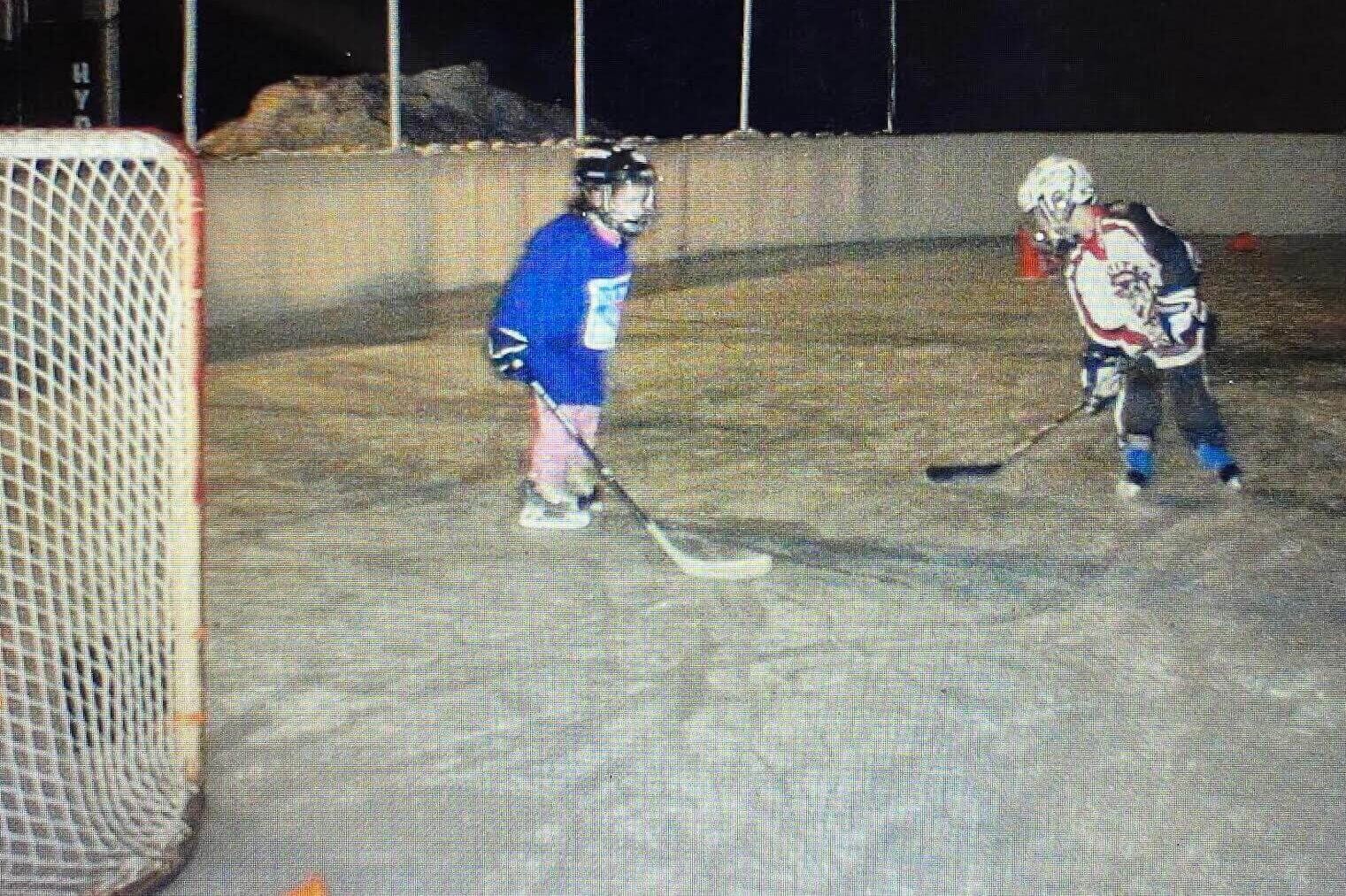 Fred’s backyard rink. (Courtesy the Samoskevich family)
Fred’s backyard rink. (Courtesy the Samoskevich family)
My wife thought I was crazy and I did too when I was about halfway done,” Fred says, chuckling to himself.
By the time the twins arrived and Fred got Maddy onto the ice, she took off walking, her pacifier still in her mouth. Mackie was a different story.
“Mackie started bawling his eyes out,” Fred says. “It probably took him a week to get over it. But I tell ya, once he got over it, he just took over past there.”
Together, the three kids grew up spending their afternoons after school out back, with Melissa showing her younger siblings the ropes. When they’d get called in for dinner, Mackie would strap on goalie gear in the kitchen while Maddy took shots at him. On weekends, they’d follow Melissa to hockey tournaments with her travel team in Eastern New York, stickhandling their way in and out of arena lobbies.
“Part of the reason why they’re the best of friends is because we’ve been together every weekend for their entire lives,” Fred says. “That’s what we loved about it. We were on vacation pretty much every week. We didn’t go to Disney World, we didn’t go for a week to the Caribbean or anything like that. We were in Philly, we were in Boston, we were in Toronto, we were in Edmonton.”
The twins were always inseparable, with Mackie choosing forward and Maddy choosing defense so that they could practice against one another. Both Melissa and Maddy played boys hockey until their bantam years, so Mackie and Maddy also played on the same team until he began playing AAA up a year with the 2001 age group. 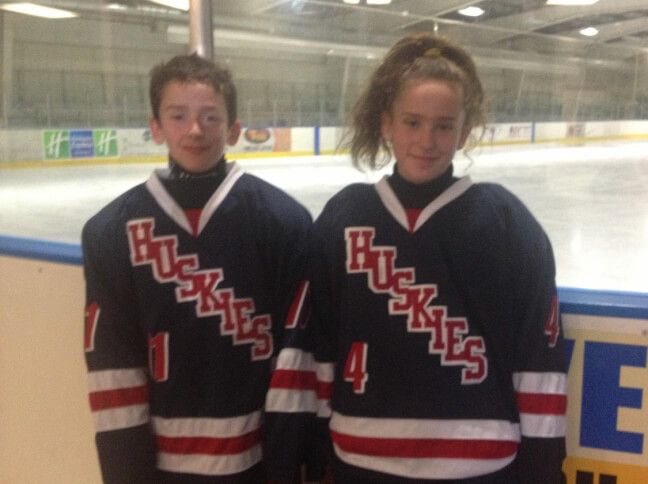 Mackie and Maddy also played spring and summer hockey together. (Courtesy the Samoskevich family)
Mackie and Maddy also played spring and summer hockey together. (Courtesy the Samoskevich family)
Every step of the way, Melissa was always there to give them pointers after their games.
“She taught us a lot growing up. Just seeing her love for the sport made us fall in love with it,” Maddy says. “And then when she put the work into it, it paid off.”
That work carried Melissa to the pinnacle of the sport. Beyond Shattuck, she played for Team USA’s women’s under-18 team twice (collecting a gold, a silver, and a spot on the tournament all-star team in her second appearance). She then spent four years at Quinnipiac University, including two as captain. She was the second overall pick of the Connecticut Whale in the 2018 NWHL draft. In 2019, she won gold with Team USA again, this time at the women’s world championships. This past season, she was hired as an assistant coach with Penn State’s women’s team (though she’s not yet prepared to call herself retired).
Mackie and Maddy have always tried to follow in her footsteps.
After finishing fifth grade, they both also attended Shattuck. In 2019, Maddy played for Team USA at the under-18 worlds, just like her big sister had. She then also committed to Quinnipiac, where she has just finished her freshman year.
Mackie’s turn to represent Newtown is up next at the University of Michigan — and the NHL beyond that. He spent two years with the USHL’s Chicago Steel following his time at Shattuck.
“To see my sister in those spots, it’s something that I want to do, to be on TV and have everyone watching,” Mackie says. “Just seeing where she was and how she got there has been a huge thing in my life.
“And I also want to represent Sandy Hook. It’s my favorite place in the world.”
Mackie calls his two sisters his best friends, a bond that they all say was strengthened in the years after the shooting.
These last two years, Mackie has called his sisters every week from Chicago. This year, when he broke his finger crashing into the boards, they dreaded being away from him.
As a family, they found the pandemic most difficult because none of the five do well being away from each other. In a normal year, Fred and Patty would visit Mackie half a dozen times in Chicago. This season, they weren’t able to visit until they were both double-vaccinated around playoff time, as Mackie’s Steel chased and won the USHL’s Clark Cup.
As soon as they’d won, he couldn’t wait to get home to celebrate it with them.
“When I’m at home, I’m not usually out and about with other friends because we’re always together and I’d rather be with my sisters,” Mackie says. “Not everybody has that.”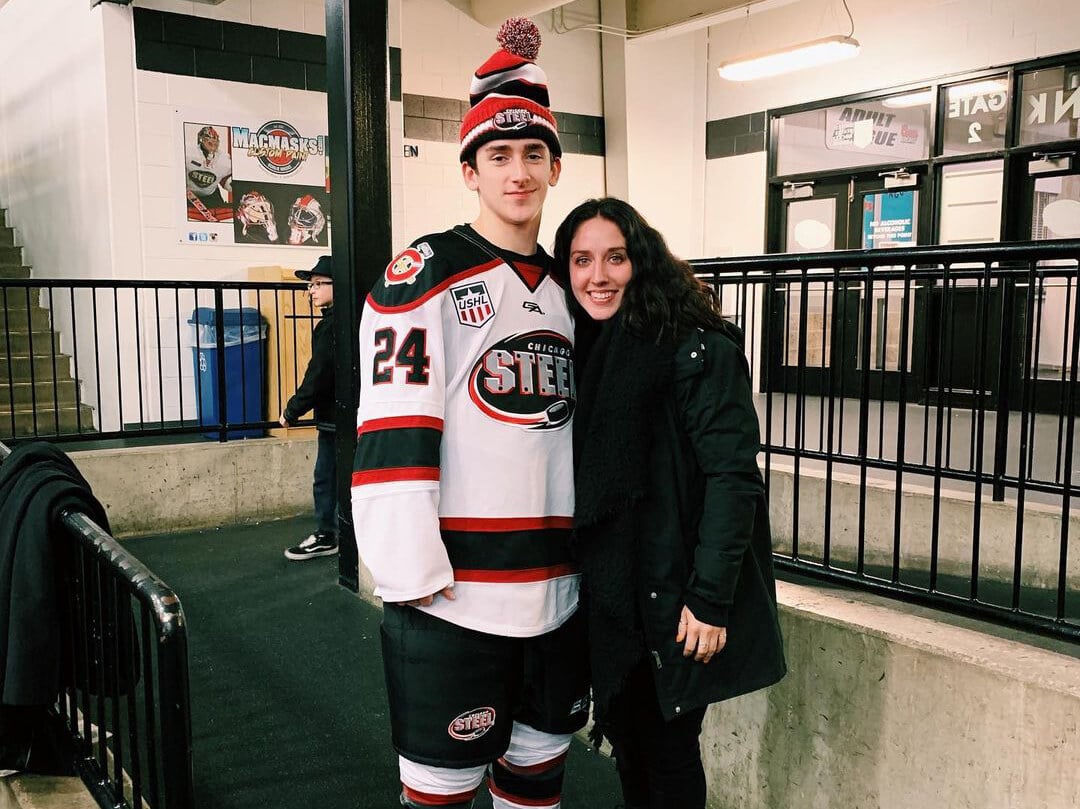 Mackie and Melissa. (Courtesy the Samoskevich family)
Mackie and Melissa. (Courtesy the Samoskevich family)
None of the people who’ve worked with Mackie over the years have asked him about Sandy Hook. Not Ben Umhoefer, who coaches and runs the program at Shattuck. Not Ryan Hardy nor Brock Sheahan, who were his general manager and coach with the Steel. Not Michigan head coach Mel Pearson, who will welcome him to the Wolverines in the fall.
But they know all about Melissa, Maddy, Patty and Fred, because Mackie’s always talking about them.
And when you ask them to describe Mackie the hockey player, they can do that.
Owen Power, Mackie’s teammate in Chicago and soon at Michigan and the presumptive No. 1 pick in the upcoming draft, calls him the most talented player he’s ever shared the ice with. Pearson gets giddy when he talks about how he may be able to use him.
Umhoefer will tell you that Mackie’s game speaks for itself.
“From a skills, skating, talent perspective, there’s really not a lot to pick holes at,” he says.
Sheahan laughs about how often Mackie appeared in the videos he showed the Steel this season, both offensively and defensively, calling him a complete player. He and Hardy also said they saw Mackie do things every night for two years that nobody else could. Mackie, Sheahan insists, is “as elite as it gets” as a skater and puck handler.
“I think he was the most skilled player in the USHL,” Sheahan says. 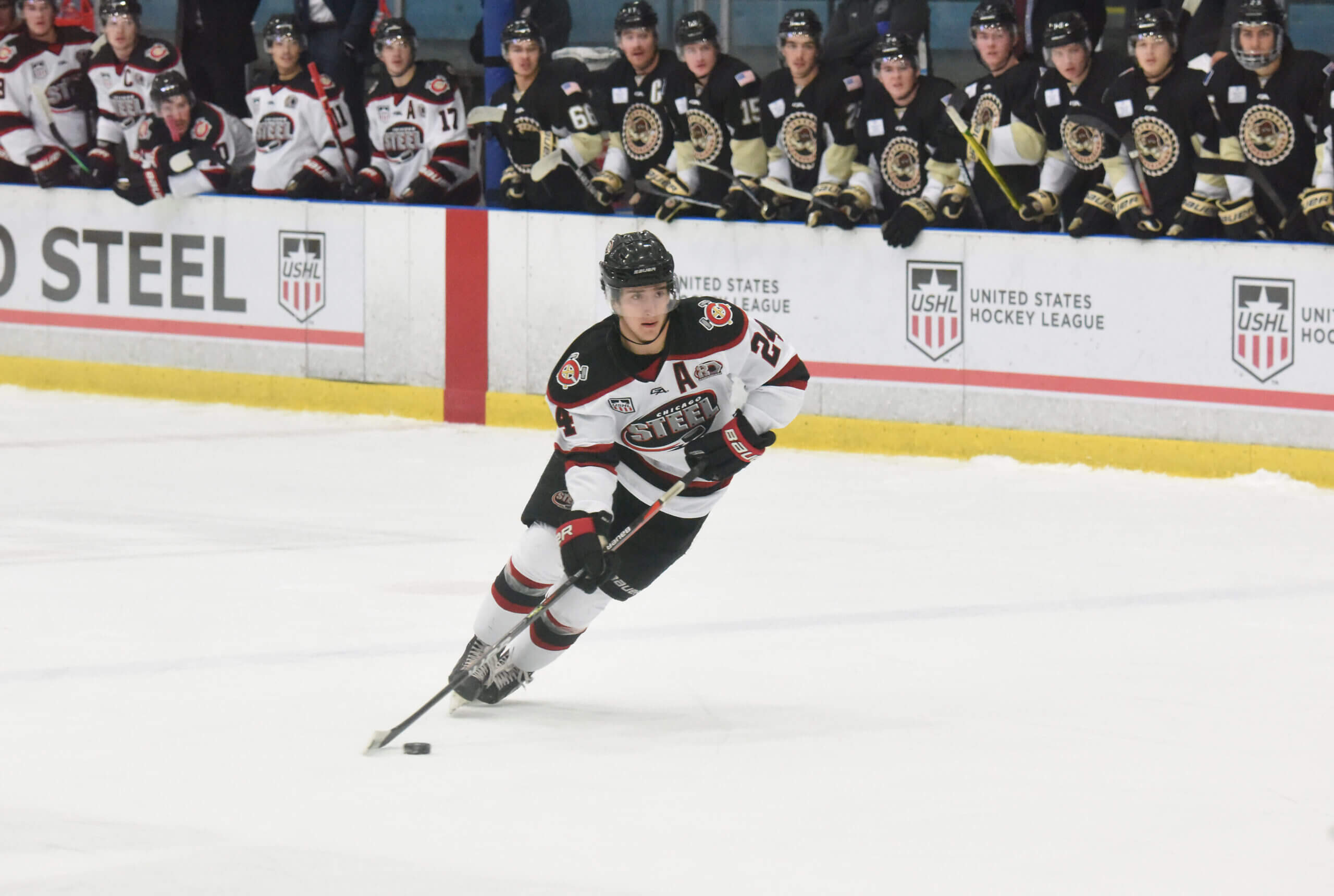 Mackie Samoskevich is NHL Central Scouting’s 26th-ranked North American skater in advance of the 2021 NHL Draft. (Courtesy Chicago Steel)
Mackie Samoskevich is NHL Central Scouting’s 26th-ranked North American skater in advance of the 2021 NHL Draft. (Courtesy Chicago Steel)
But they’d all rather talk about Mackie the person.
“The way he treats everybody is awesome,” Hardy says. “He’s a very kind and genuine person and I think that speaks to the parents that he has and the relationship that he has with his sisters.”
Sheahan will tell you that he has learned as much from Mackie as he has taught him, something he says is rare.
“He’s a great kid,” Sheahan says. “He really burns to be a player, like he really works at it. He’s the type of guy I like to just sit there and talk with.”
Umhoefer talks about the Samoskeviches as a humble, hardworking, blue-collar family who have and will accomplish special things. Though he never spoke with any of them about the shooting, he and other faculty recognized that they were shaken by it and tried to go out of their way to check in on them at Shattuck.
“Mackie was a really quiet kid with us. He never really showed a lot of emotion. He’s one of those kids that’s sometimes hard to get a read on,” Umhoefer says. “But the shooting was a really sad time for everyone that worked in education and then there was a lot of focus brought onto those kids because as a school you feel a lot of the same emotions that they feel when you see that they’re hurting.”
Mackie’s quiet nature is one of the things that all those who’ve worked with him talk about.
“Mackie is identical to me and Madison is identical to my wife. I was the same way Mackie is right now, a little quiet,” Fred says.
But to Maddy and Melissa, Mackie is a different person than the one the rest of the world sees.
To Maddy, he’s a confidante who is easy to talk to.
“He was always there for me. If I had a question about hockey, he would spend a good amount of time teaching me until I got the full answer. I feel like I’m the player that I am today because of him,” Maddy says.
To Melissa, the reserved Mackie people see at the rink is someone else altogether at home.
“He’s soft spoken but it’s funny because he’s also a little shit around the house,” Melissa says, laughing. “He’s one of the funniest kids I know when you get him going. We make fun of each other a ton. So when people see Mackie and think he’s quiet, that’s because when he’s at the rink he’s ready to work.”
Melissa thinks that attitude has taken Mackie this far.
“Me and Maddy go to the rink and work but we like the social aspect of it,” Melissa says. “The quietness of him is because he’s a 24-hour athlete. And it has paid off for him and that’s solely because of him. He’s out on our outdoor rink for hours just stickhandling by himself. Watching his work ethic is amazing. I wish I had it.”
Whenever Patty thinks about her son’s draft day, she gets nervous.
“The butterflies just drive me crazy,” Patty says.
When Melissa and Maddy think about his big day, their octave changes in excitement.
“It’s going to be amazing. I’m so proud of everything he has accomplished,” Maddy says. “He has worked so hard for this and he deserves it. It’s going to be an emotional day.”
“I’m just,” Melissa says, choking up, “yeah … I’m really proud of him. He deserves all of the attention.”
But the draft won’t be the only thing on their minds. The first thing they’ll all think of will be Newtown.
“We love Sandy Hook … um,” Fred said, pausing to collect himself once more, “it’s just sad going forward. You see one of the moms out at the grocery store and it just brings you right back to it. We’re a resilient group of people here in Sandy Hook. We help each other out as much as we can. Plus, the help we received from the world. It was amazing what everyone did for us around here, it really was.”
“It was life-changing for so many, including us,” Maddy adds. “It brought our family a lot closer. After that day, our parents were there for us and we were there for each other.”
Not a day goes by where Mackie doesn’t think about that day or his hometown.
“It’s crazy to think about all of the towns in the world and your town is the one that this happens to. To see that people are willing to do that, I can’t believe it continues to happen to other people,” Mackie said, pausing himself for the first time. “But at the end of the day, it was a pretty amazing thing to see Sandy Hook come together. It was a positive thing in one small way, how everyone was able to come back from it the way that they did.”
And it’s that last part, that sliver of good, that he’ll carry with him.
It’s a reminder, he says, of how little hockey actually matters, and of how much his weird little hockey family does.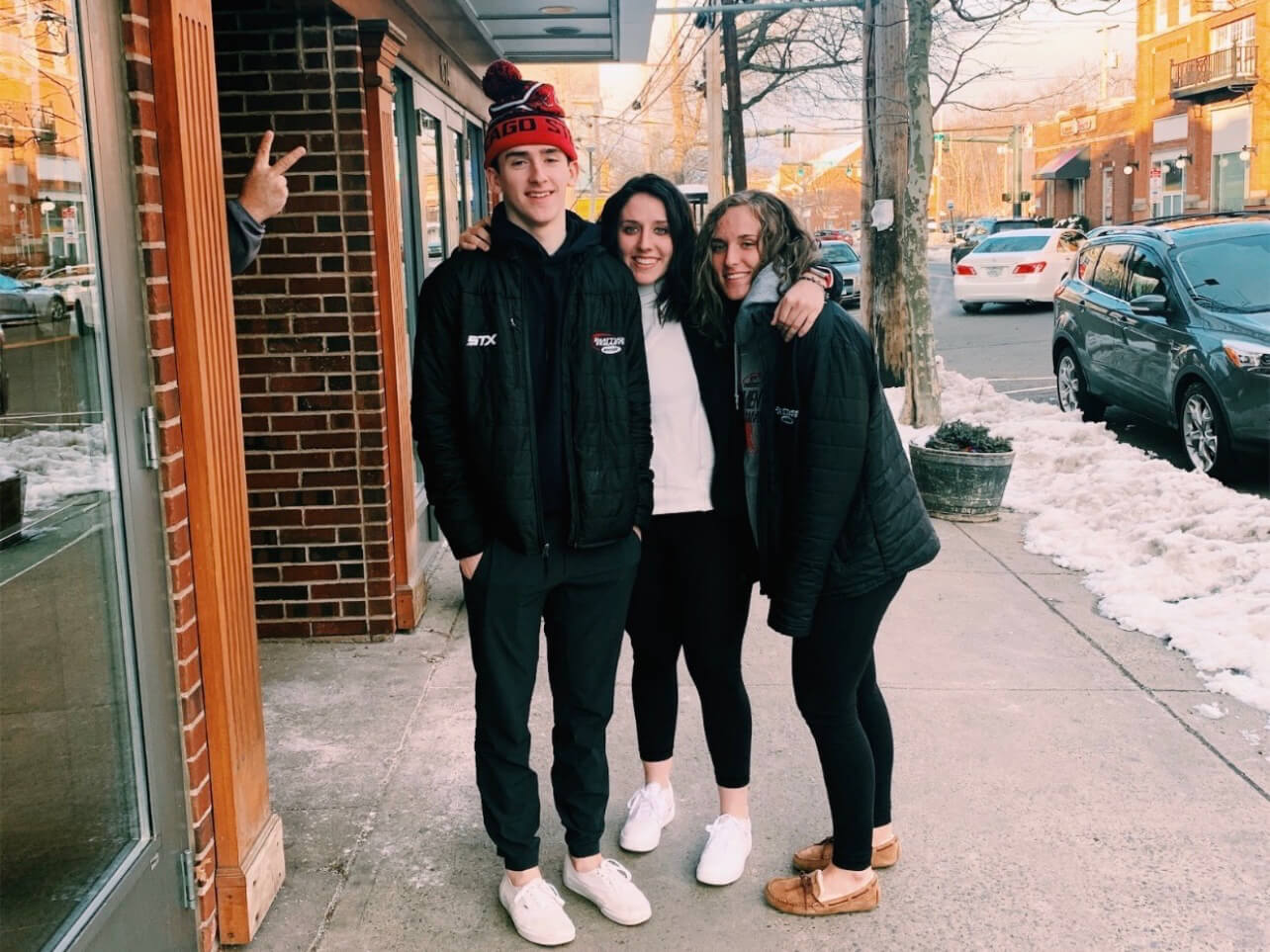 Mackie, Melissa and Maddy Samoskevich. (Courtesy the Samoskevich family)
Mackie, Melissa and Maddy Samoskevich. (Courtesy the Samoskevich family)
(Graphic: John Bradford / The Athletic; photos: Courtesy the Samoskevich family)
